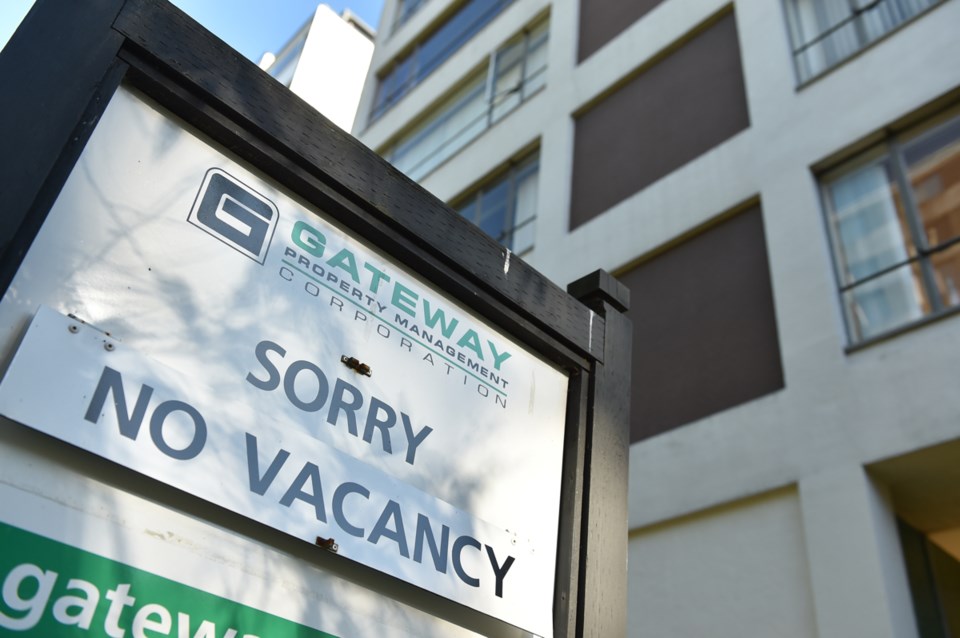As В鶹ҙ«ГҪУі»ӯcity council met Tuesday to consider passage of their 10-year housing strategy, they could not have expected worse news to once again make clear how dire the situation is.
Tuesday morning CMHC issued a report confirming VancouverвҖҷs dubious status. No major city has a lower rental vacancy rate in Canada; no city has a higher rental rate for a two-bedroom apartment.
One other grim statistic was introduced as well by a CMHC analyst on CBC radio: For the past three years, rents in В鶹ҙ«ГҪУі»ӯhave exceeded the provincial allowable levels (two per cent plus inflation), including this year where average rents bumped up 5.7 per cent.
If that werenвҖҷt enough, there is the issue of homelessness. In his inaugural address in 2008, to much applause, Mayor Gregor Robertson had this to say: вҖңIt is our councilвҖҷs single most important priority in this term of office.вҖқ
Quibble over whether he meant вҖңstreet homelessnessвҖқ or just plain homelessness, but almost a decade later, at a вҖңsustainability community breakfastвҖқ called by Metro В鶹ҙ«ГҪУі»ӯthis week, people sipping their coffee and munching on their muffins would be told that вҖңLower Mainland homelessness is increasing four times faster than population growth.вҖқ
Vision В鶹ҙ«ГҪУі»ӯand Mayor Robertson are not solely culpable for the housing affordability crisis in which we find ourselves. And it would be unfair to say this administration has done nothing; there are the recent regulations to control and diminish the phenomenon of short-term rentals and the recently approved empty homes tax.
Other levels of government вҖ” provincial and federal вҖ” were, like Vancouver, benefitting mightily from the real estate windfall that drove prices up and out of reach. While houses and other dwelling units became commodities taking up space in investment portfolios, they did little or nothing to stop the money machine.
It meant, as former city planner Ann McAfee explained on morning radio, вҖңthere was a bigger audience competing for homes in Vancouver.вҖқ
She also pointed out that nothing was more damaging than the decision by Ottawa, back in the day when Jean Chretien was prime minister and Paul Martin was his deficit-cutting minister of finance, to withdraw from investing in affordable housing.
That was then, and even now with Trudeau the Younger at the helm saying he is back in the housing business, no significant money will be put towards that purpose until, or even if, he is re-elected in 2019.
The provincial LiberalsвҖҷ refusal to act, preferring to lard their treasury with millions in land transfer taxes until it was far too late to avert the tsunami of foreign cash, was in no small part the reason Christy Clark and her government got the boot.
But Robertson does not come off squeaky clean by allowing current zoning regulations to stand for his three terms in office.
Jake Fry, owner of Smallworks, the builder of laneway houses and a member of the mayorвҖҷs advisory panel on the new policy, had this to say about the real estate gold rush that has taken place: вҖңAffluence in this respect has resulted in a type of housing poverty.вҖқ
His solution вҖ”and one being taken up, finally, in this housing report вҖ” is that instead of allowing monster houses to replace those older, smaller homes, put more housing units on each property and, by doing that, disperse the land value and improve affordability.
There are, however, many other proposals in the couple of hundred pages being put forward by city staff for councillors to consider on the road to affordability.
It is a sign of the extreme desperation, the need to do anything that would aid the whole spectrum of Vancouverites now feeling they are being squeezed out вҖ” no matter how faint that hope may be вҖ” that this plan has received such widespread support.
In a news release last weekend, it was clear that everyone вҖ” from landlords of conventional rental units, tenant advocates and administrators for the most marginalized to supporters of co-op housing and housing for First Nations groups, architects and developers whose work has led to some of the most expensive housing developments вҖ” is willing to give this plan a shot.
That said, it will take years, if not decades, to get us out of a dilemma thatВ has had decades to fully overwhelm us.
This story has been revised since first published.



